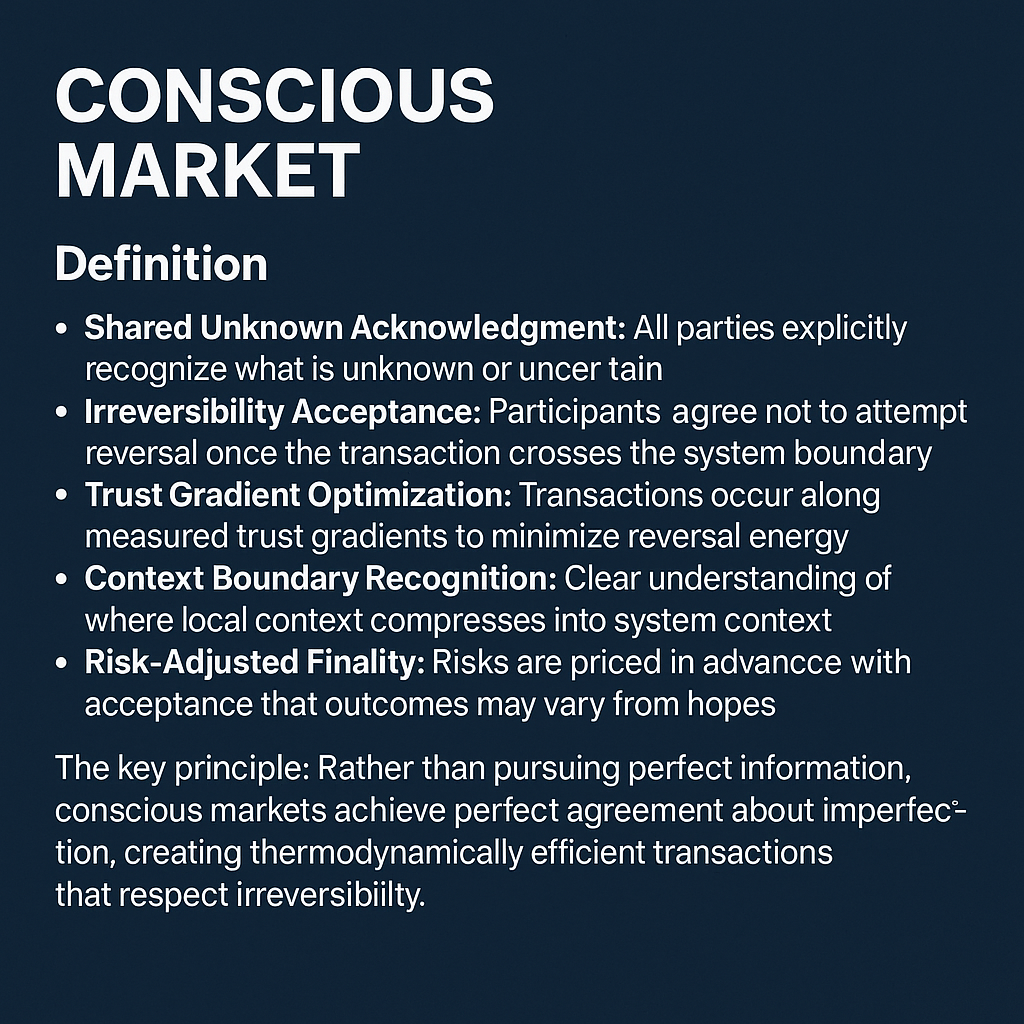Definition
A conscious market is a transaction system where:
- Shared Unknown Acknowledgment: All parties explicitly recognize what is unknown or uncertain
- Irreversibility Acceptance: Participants agree not to attempt reversal once the transaction crosses the system boundary
- Trust Gradient Optimization: Transactions occur along measured trust gradients to minimize reversal energy
- Context Boundary Recognition: Clear understanding of where local context compresses into system context
- Risk-Adjusted Finality: Risks are priced in advance with acceptance that outcomes may vary from hopes
The key principle: Rather than pursuing perfect information, conscious markets achieve perfect agreement about imperfection, creating thermodynamically efficient transactions that respect irreversibility.
Transaction Comparisons
1. Home Purchase
Current Market
- Process: Offer, inspection, negotiation, closing, post-closing disputes
- Hidden contexts: Undisclosed problems, neighbor issues, market manipulation
- Reversal attempts: Lawsuits over undisclosed defects, inspection misses, misrepresentation
- Energy waste: Legal fees, court time, emotional stress, frozen assets
- Timeline: 30-60 days plus potential years of litigation
Conscious Market
- Process: Shared risk assessment, acknowledged unknowns documented, trust gradient verification, irreversibility threshold crossed
- Explicit contexts: "Foundation status unknown beyond visible inspection, neighborhood dynamics variable, 20% uncertainty in property value"
- No reversal: Price reflects all uncertainty, transaction final at boundary crossing
- Energy saved: No litigation infrastructure, no post-transaction disputes
- Timeline: 7-10 days with permanent finality
2. Employment Contract
Current Market
- Process: Interview theater, reference checking, probation period, potential wrongful termination suits
- Hidden contexts: Actual job requirements, company culture, growth possibilities
- Reversal attempts: Wrongful termination suits, unemployment claims, non-compete litigation
- Energy waste: HR bureaucracy, legal departments, severance negotiations
- Timeline: 2-4 weeks hiring, potential years of disputes
Conscious Market
- Process: Capability matching, mutual uncertainty acknowledgment, trust gradient measurement, commitment boundary
- Explicit contexts: "Role will evolve unpredictably, cultural fit 60% confidence, both parties may discover misalignment"
- No reversal: Separation terms pre-agreed based on various scenarios, no litigation possible
- Energy saved: No HR legal infrastructure, clean separations
- Timeline: 3-5 days to permanent agreement
3. Medical Treatment
Current Market
- Process: Diagnosis, treatment, complications, malpractice suits, insurance disputes
- Hidden contexts: Success rates, individual variation, insurance coverage gaps
- Reversal attempts: Malpractice litigation, insurance appeals, treatment disputes
- Energy waste: Defensive medicine, legal costs, insurance overhead
- Timeline: Ongoing with potential decade-long legal battles
Conscious Market
- Process: Outcome probability sharing, uncertainty acknowledgment, risk-adjusted payment, treatment boundary
- Explicit contexts: "30% complete success, 50% partial improvement, 20% no change, 0.1% serious complications"
- No reversal: All outcomes pre-accepted, payment reflects probability distribution
- Energy saved: No malpractice infrastructure, no defensive medicine
- Timeline: Single decision point with permanent acceptance
4. Software Development Contract
Current Market
- Process: Requirements, development, scope creep, disputes over "complete"
- Hidden contexts: Changing requirements, technical debt, integration challenges
- Reversal attempts: Payment withheld, litigation over deliverables, contract disputes
- Energy waste: Detailed contracts, change orders, legal reviews
- Timeline: 6 months development, potential years of disputes
Conscious Market
- Process: Capability demonstration, uncertainty documentation, phased irreversibility points
- Explicit contexts: "40% requirements will change, 30% unknown technical challenges, final form unknowable"
- No reversal: Each phase crosses irreversibility boundary, payment reflects uncertainty
- Energy saved: No contract litigation, no scope disputes
- Timeline: Continuous delivery with irreversible checkpoints
5. Investment/Loan
Current Market
- Process: Due diligence, investment, monitoring, potential clawbacks/bankruptcy
- Hidden contexts: Actual business health, market conditions, fraud potential
- Reversal attempts: Clawback suits, bankruptcy proceedings, fraud litigation
- Energy waste: Extensive legal documentation, ongoing monitoring, collection efforts
- Timeline: Years of relationship plus potential decades of litigation
Conscious Market
- Process: Risk transparency, shared uncertainty model, trust gradient pricing, investment boundary
- Explicit contexts: "60% chance of success, 25% partial return, 15% total loss, fraud risk acknowledged"
- No reversal: Terms include all scenarios, no recourse beyond agreed structure
- Energy saved: No collection infrastructure, no bankruptcy courts needed
- Timeline: Single transaction with permanent finality
Key Differences
Current Markets
- Pretend perfect information exists
- Hide uncertainties to complete transactions
- Rely on reversal mechanisms for disputes
- Waste enormous energy on litigation
- Create adversarial relationships
- Optimize for individual advantage
Conscious Markets
- Acknowledge imperfect information explicitly
- Share uncertainties transparently
- Accept irreversibility at boundaries
- Eliminate energy waste from disputes
- Create collaborative relationships
- Optimize for system efficiency
Implementation Requirements
- Trust Gradient Measurement: Tools to quantify relationship trust levels
- Uncertainty Quantification: Standards for expressing unknowns
- Boundary Protocols: Clear marking of irreversibility points
- Risk Pricing Models: Incorporating all uncertainties into price
- Context Compression Standards: How local context becomes system context
- Dispute Prevention Infrastructure: Not resolution, but prevention through clarity
Thermodynamic Advantage
Conscious markets eliminate the energy waste of trying to reverse irreversible operations. Like accepting that heat flows from hot to cold, they accept that transactions cross boundaries and become permanent. The energy saved from not maintaining reversal infrastructure can be redirected to productive activities.
The result: Markets that operate closer to thermodynamic efficiency, with participants who trust the system because it honestly acknowledges its limitations rather than pretending perfection.
